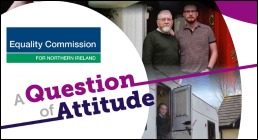
31/01/2018
Findings from our latest Equality Awareness Survey.
“We know that our attitudes towards other people affect how we behave towards them and that negative attitudes can lead to negative behaviours - that is why it is important that we track social attitudes here in Northern Ireland.”
Dr Michael Wardlow, Chief Commissioner of the Equality Commission, was speaking today after the publication of survey findings on social attitudes and perceptions of equality in Northern Ireland. The survey follows similar studies in 2005, 2008 and 2011, which allows some comparisons on attitudinal change to be drawn.
“The results of this survey raise interesting questions about changing attitudes to difference in Northern Ireland – and about some prejudices which are apparently harder to shift.”
We asked respondents how positive or negative they felt towards different equality groups. We found that, overall, attitudes were much more positive than in previous surveys, in particular towards Travellers, lesbian, gay and bisexual people and trans people. Positive attitudes to LGB people were up from 57% in 2008 to 83% in 2016 and for transgendered people up from 48% in 2011 to 78% in 2016.
When asked if there is sometimes good reason for people to be prejudiced against certain groups, two thirds said that there were no circumstances in which prejudice was acceptable.
Against this context, however, it is worrying that the five most negatively viewed groups are all based on race or nationality – Travellers, Roma, asylum seekers and refugees, migrant workers and minority ethnic groups.
When asked how much they would mind someone from one of the equality groups as a work colleague, as a neighbour, or married to a close relative, the survey’s respondents were more positive towards all equality groups across all three social distance scenarios.
Travellers, Roma, migrant workers and minority ethnic groups were also the equality groups with the highest proportions of respondents who ‘would mind’ them as a work colleague, a neighbour or as an in-law.
Travellers still attracted the most negative attitudes, with 1 person in 4 indicating that they would mind working alongside a Traveller and a third that they would mind having Travellers as neighbours or as an in-law.
A further worrying prejudice is against people with mental ill health. One in ten respondents would mind someone with mental ill health as a work colleague, 11% would mind them as a neighbour and 14% would mind them being an in-law. Again, although these figures are less than half that shown in the last survey in 2011, it is clear that an underlying problem remains.
“While it is encouraging to see this overall reduction in negative attitudes, it seems some prejudice remains deep-seated here in Northern Ireland, particularly with regard to those form a different race or nationality,” Dr Wardlow said.
“Half of those surveyed think that no groups are treated more unfairly than other groups in Northern Ireland. This could suggest that respondents did not see equality as being relevant or important at the time they answered the question. In the Equality Commission, we know from the 3000+ calls we take every year about potential discrimination that equality remains a live issue and that people do feel they are discriminated against because of who or what they are.
Dr Wardlow concluded: “In March we will be hosting a panel discussion event as part of the Imagine Belfast festival of ideas and politics, where we will unpack some of these questions and gather views on what they mean - for Government and policy makers, for the Commission and its work and for all of us who live here.”
Further information: